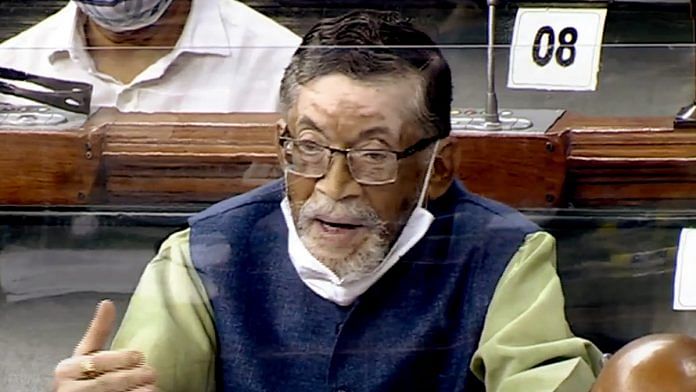New Delhi: With opposition parties organising a boycott, the Lok Sabha Tuesday passed the three labour codes — on industrial relations; occupational safety, health and working conditions; and social security — without a hurdle.
The codes not only aim to reform India’s archaic labour laws, but also expand their ambit to provide social security benefits to workers in the unorganised sector as well as those who migrate to other states for work.
The three codes are likely to be taken up for consideration in Rajya Sabha Wednesday. A fourth code, on wages, was passed by Parliament last August.
Also read: Modi govt’s new labour code will make it tougher for workers to strike, sacking easy
What the codes aim to change
There are many firsts in the three labour codes, which have been in the making since 2003. The three codes are an amalgamation of 25 labour laws.
Following the migrant crisis that unfolded amid the Covid-induced lockdown, the government has expanded the definition of “inter-state migrant worker” to ensure that no one gets left out of the social security net in future.
For the first time, income criteria will be included to define a migrant worker under the Occupational Safety, Health and Working Conditions Code. All workers whose monthly family income is less than Rs 18,000, and who migrate to another state and get directly employed or self-employed, will be covered.
The Social Security Code, 2020, has included freelancers, also known as ‘gig workers’, and platform workers — those who provide services using online platforms, such as delivery personnel working with food aggregators like Zomato and Swiggy and cab drivers with aggregators such as Ola and Uber. This code also proposes setting up a Gig and Platform Workers’ Social Security Fund, where aggregators will have to put aside 1-2 per cent of their annual turnover to meet the social security needs of their workers.
The Industrial Relations Code, 2020, makes it easier for companies to hire and fire workers. Currently, it is compulsory for firms employing up to 100 workers to frame standing orders — essentially the rules of conduct for workers employed in industrial establishments — but according to the new code, companies with up to 300 workers don’t require standing orders for their workforce. This code will also make it difficult for workers to go on flash strikes.
Also read: Modi govt says suspension of labour laws not reform, raises concern over states changing laws
What happened in Parliament
The Narendra Modi government was able to pass the three codes smoothly because over a dozen opposition parties led by the Congress boycotted the proceedings, in solidarity with the eight opposition MPs who were suspended from the Rajya Sabha.
Had opposition parties been in attendance in the Lok Sabha Tuesday, they would’ve surely opposed some provisions, especially those related to hiring and firing of workers by companies and clauses related to fixed-term employment in the Industrial Relations Code, as well as the mandatory requirement of Aadhaar cards for availing benefits under the Social Security Code.
Union Minister of State with Independent Charge for Labour and Employment Santosh Kumar Gangwar initiated the discussion, describing the codes as game-changers and milestone in ensuring labour welfare.
“We have endeavoured to balance the interests, rights and obligations of employees and the employers,” he said.
Gangwar said several provisions in the three codes have been made for the first time in 73 years. “These include the right of letter appointment, which will encourage formal employment. Besides, the definition of migrant labourer has been expanded to also include those who move to other states for work without routing through contractors,” he said, adding that this will help them benefit from welfare schemes.
The minister also informed the Lok Sabha that a mechanism has been proposed for re-skilling those workers who have been removed from work.
Opposition members who did not boycott, such as BJD’s Pinaki Misra, flagged concerns that some of the provisions in the three codes directly encroach on the powers of the states.
TDP’s Jayadev Galla, meanwhile, expressed concern that the mandatory requirement of Aadhaar card for availing benefits under the Social Security Code was a violation of the Supreme Court’s order.
Gangwar assured the House that he would look into the issues raised by the MPs.
Thanks to the opposition parties’ boycott, some amendments moved by opposition MPs against some provisions could not be taken up.
Also read: Do Modi govt’s labour code amendments hurt worker rights or are they good for industry?




seems opposition party is not serious about opposing the bills.
By walking out they allowed passage of the bills to keep their corporate masters happy.